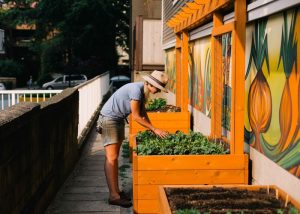You are visiting Liisbeth’s archives!
Peruse this site for a history of profiles and insightful analysis on feminist entrepreneurship.
And, be sure to sign up for rabble.ca’s newsletter where Liisbeth shares the latest news in feminist spaces.

During the First and Second World War, allied governments encouraged citizens to plant backyard “victory gardens” as a way to alleviate pressure on a food system redeployed to feed troops on the front lines. Almost a century later, a Vancouver-based urban gardening company named after the initiative is helping fight another kind of war: the COVID-19 pandemic.
The coronavirus is exposing dangerous vulnerabilities in our overly concentrated, industrialized food system. Outbreaks in massive food-processing plants across North America have caused shutdowns, forcing farmers to kill stockpiled livestock, throw away produce and dump dairy products. As well, restaurant closings and disrupted global supply chains have led to shortages in supermarkets or surplus supplies trashed, while people go hungry.
The owners of Victory Gardens realize that a small gardening company cannot solve all those problems, but educating people about how good food is produced–by growing good food in home and school gardens–is a good start. With people rattled by food shortages or struggling to keep kids entertained at home, the company has been inundated with requests for garden design and installation, maintenance, supplies, coaching and education. Luckily, the structure of Victory Gardens – a small, feminist, worker-owned cooperative–has enabled it to adapt quickly.
Finding Inspiration in Your Own Backyard
Lisa Giroday, Sam Philips and Sandra Lopuch founded Victory Gardens in 2012 when friends started asking the avid home gardeners for help growing food in their backyards. The friends quickly realize they had a business opportunity at hand. “We totally bootstrapped it,” says Giroday. “We held a fundraiser at the beginning of our first year and made like $3,200 bucks, and then bought all of our tools on Craigslist and our truck off my partner who generously let us pay them back over time. And we just saw what we could do.”
From the start, they decided to become a worker-owned co-op as it reflected how they operated –with equal decision making, input of labour and ownership. Lopuch recently left the company, which now has four worker-owners, two seasonal employees and various subcontractors. They design, build, plant and maintain ecological gardens, and even babysit gardens while a client is away. Their coaching covers all aspects from planting to harvesting.

Digging and Growing, Online
When the pandemic hit, many schools and facilities were forced to close. This shuttered Victory Gardens’ extensive school garden program and put major projects on hold, wiping away nearly a third of its revenue.
Giroday says having four worker-owners with diverse ideas has helped respond to the current crisis in creative ways. They used the federal government’s emergency wage subsidy initiative to retain their employees and redeployed them to meet the spike in demand in other areas.
To protect the safety of its employees, Victory Gardens decided not to work with apartment and condo buildings to service balcony gardens. Instead, the company started offering online consultations to design and build garden boxes then virtually coach people to install, plant and maintain their balcony gardens.
For gardens at residential properties, workers commute in separate vehicles and maintain physical distancing while working outside.
In the early days of the pandemic, the company noticed a huge jump in visits to its online shop, which was initially set up as a way for people to book and pay for installation and maintenance services. When major garden centres closed, clients were scrambling for supplies such as seeds, fertilizer and tools. “We had done a big purchase at the beginning of the season,” says Giroday, and they quickly made these available online. Sales, she said, “went through the roof.”
The spike in interest in online shopping has inspired the owners to rethink how they offer education and coaching. “We have a ton of curriculum, we’ve been developing content for ten years,” says Giroday. So they developed educational webinars they can offer through winter, both extending their work into the off season and making gardening education even more accessible.
Growing Big Ideas
The increased demand for home gardens has come from parents looking for creative ways to educate, entertain and connect kids with nature while self-isolating at home. But Giroday says people are also reaching out for their services out of fear of food scarcity and disruptions.
While an acre of land is required to produce enough food to feed a family of four, Giroday believes even a tiny garden can play an important role. It teaches people about the challenges of growing food, especially without harmful pesticides and chemical fertilizers, and also the rewards–how good fresh organic produce actually tastes. People with home gardens are more likely to support farmers’ markets and alternative food systems. And a small garden can still produce an abundance of food, alleviating pressure on budgets and giving people a greater sense of food security.

Staying Strong by Sticking Together
Victory Gardens believes its nimble response to pandemic disruptions would not have been possible had it followed the advice given to the owners early on. Looking for financing to expand, Victory Gardens reached out to Vancity, a cooperative that provides banking and financial services to its members. “They said, we love what you do. They liked that we were (then) three women doing urban agriculture and were aligned with their values,” says Giroday. Vancity agreed to a portion of the loan and encouraged the owners to reach out to another lending institution to cover the rest. That institution was also excited by the startup and set them up with a mentor while waiting for the loan application to be approved. “We were basically green lit.” But the founders received a phone call a few days later suggesting they ditch “the co-op thing” and become an articled corporation. The reason? The bank believed that having several worker-owners would dilute decision making as the co-op grew. Giroday can laugh now. “I was so offended. I said, being a cooperative, having more voices at the table, having a diverse cross section of opinions, makes us so much stronger.” They refused to become a corporation and the loan fell through. Vancity, on hearing the story, ended up picking up the balance. “They definitely stood up for Victory Gardens and what we are doing.”
Ironically, Giroday admits, the four worker-owners are now working through the challenges presented by non-hierarchical and democratic/consensus decision making. The four all pitch in to help where they’re needed even though each specialize in different aspects: Giroday in design and installation; Philips on education, design and installation; Jenna Jaski in education; and the lone male on the team, Maxim Winther, in carpentry. The challenge comes in knowing what decisions they should bring to the group or decide independently. “Where does one’s role start and stop? What is essential information for everyone to know and what is not essential to know as business owners? To what degree can we behave autonomously? Where are the boundaries within autonomous decision making and actions? Then there are practical questions, how do we make decisions effectively?”
Giroday says the cooperative model is really attractive as it means community, support, democracy, equity. People are drawn to those values. But she warns there’s a learning curve to being a business owner and a member of a coop. It takes time be engaged with aspects of the business at a high level. Ten years in, they are still working on their model – but they’re not ditching it. Having a diversity of ideas is their strength, she says.
And they will need it as this year’s “off season” promises to be busy as they grapple with challenges – how to grow their online store, deliver education webinars, offer virtual coaching, and get prepared for a return to “normal” next spring with a larger slate of clients added this year on top of school gardens reopening.
“We grew about 30 per cent from 2018 to 2019,” says Giroday. “We’re excited… things are feeling a little intense and we need to make space and time for that.”
LiisBeth Media is a 100% womxn-owned and led, reader supported media enterprise. If you enjoyed this story and would like to see more, please consider becoming a donor subscriber today! [direct-stripe value=”ds1577108717283″]
Related Reading
https://www.liisbeth.com/2020/03/25/when-great-granny-inspires-great-work/
https://www.liisbeth.com/2019/09/24/brewing-up-a-revolution/
https://www.liisbeth.com/2019/04/30/butchers-bakers-changemakers-the-nightwood-society/
You are visiting Liisbeth’s archives!
Peruse this site for a history of profiles and insightful analysis on feminist entrepreneurship.
And, be sure to sign up for rabble.ca’s newsletter where Liisbeth shares the latest news in feminist spaces.





